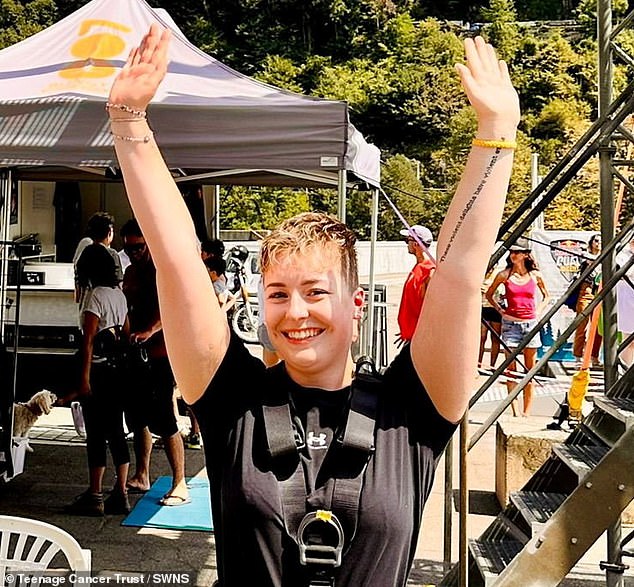Woman, 21, Diagnosed With Deadly Cancer Increasingly Common Among Young People, Reveals Little-Known Symptom She Ignored for Two Years
A student whose telltale cancer symptoms were dismissed as ‘teenage problems’ has warned young people to insist doctors take them seriously – especially if they are experiencing five ‘red flag’ warning signs.
Georgia Kennedy, now 21, from Peterborough, was 19 when she was diagnosed with Hodgkin’s lymphoma – a form of blood cancer that is becoming increasingly common in people under the age of 20.
The trampoline gymnast coach had been struggling with fatigue since she was 15, which was so severe that she was forced to stop all sporting activities.
She claims doctors told her she would “grow out of it.”
However, Mrs. Kennedy also had another sign of blood cancer that she herself ignored: a lump on her neck around the collarbone, which doctors also failed to notice.
In October 2022, she visited a GP for help with a cough that wouldn’t go away.
“They looked at my notes, saw that I had asthma when I was younger and told me to use inhalers for a few weeks,” she said.
‘It kept getting worse, so a few weeks later I called them again and they asked how I wanted to proceed. I was only 19, I had no idea.
Georgia Kennedy, from Deeping Gate in Peterborough, was just 19 years old when she was diagnosed with Hodgkin’s lymphoma – a form of blood cancer

The trampoline gymnastics coach (pictured a week before she was diagnosed) had struggled with fatigue since she was 15. The fatigue was so severe that she stopped all her sports and reduced her activities, but claims doctors told her she would grow out of it.
‘I ended up having a chest x-ray a few days later. They said the scan looked abnormal but it was nothing urgent and that I would get a more detailed picture after Christmas.’
Three days before Christmas 2022, Mrs Kennedy noticed she was having trouble breathing and went to the emergency department at Peterborough City Hospital, where doctors carried out another scan.
It was here that a nurse gave her the devastating news that, based on the x-ray, although the cough could be an infection, it was most likely cancer.
The lump, which had grown very slightly over two years, was a swelling in her lymph nodes, typical of her type of blood cancer.
Hodgkin lymphoma is a rare form of cancer that develops in the lymphatic system, a network of blood vessels and glands called lymph nodes that are part of the immune system and spread throughout the body.
Lymph nodes usually swell in response to infection as a cluster of fighter cells gather in the gland to destroy the invader. But they usually return to their normal size after a short time.
However, in Hodgkin’s lymphoma, these cells develop abnormally quickly, causing permanent growths in the lymph nodes.
“I hadn’t even registered cancer as an option, so I thought that couldn’t be true,” Ms Kennedy said.
‘I remember having tunnel vision, I couldn’t really hear anyone and it was like my senses were gone. I just sat there thinking this couldn’t happen.”
Hodgkin’s lymphoma is diagnosed in around 2,000 Britons every year. But according to Cancer Research UK, cancer rates are rising among young people, with cases among people under 24 increasing by 32 percent since the early 1990s.

Mrs. Kennedy also had another sign of blood cancer: a lump in her neck around the collarbone. But because it grew slowly, she thought nothing of it

Ms. Kennedy underwent six cycles of chemotherapy, which she completed in May 2023. After her remission she started traveling and is now studying drama at the University of Manchester.
In addition to lumps in the lymph nodes, the cancer can also cause shortness of breath, persistent coughing and fatigue – due to anemia due to low red blood cell counts.
Spotting symptoms early and getting a diagnosis before the cancer has spread can save lives.
But most young people don’t know the key warning signs of teenage cancer.
Research from the Teenage Cancer Trust shows that only 17 percent of 13-24 year olds know all five of the top warning signs of cancer in young people.
These symptoms include: lumps and swellings anywhere on the body, unexplained fatigue, changes in moles, persistent pain and an unexplained change in weight.
“You’re told to check for lumps and bumps in your breasts, but you’re never told to check somewhere else, like your neck or lymph nodes, so you don’t,” Ms Kennedy said.
‘I had also lost about 10 kilos from the summer to that Christmas and again I didn’t notice anything.
‘I feel like I’m partly to blame because I didn’t notice a lot of these things and I think my mother feels a little guilty about that too.
“But you never think it will turn into cancer and the symptoms can last for a longer period of time than you think.”
Ms. Kennedy underwent six cycles of chemotherapy, which she completed in May 2023, and is now in remission.
She celebrated her recovery by traveling and is now studying drama at the University of Manchester.
Louise Soanes, chief nurse at the Teenage Cancer Trust, said: ‘It’s so important to know your own body to be able to spot any changes.
‘Although cancer in young people is rare, it does occur, so it is very important that young people know the most common symptoms.’
